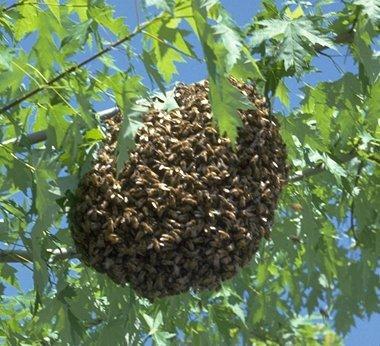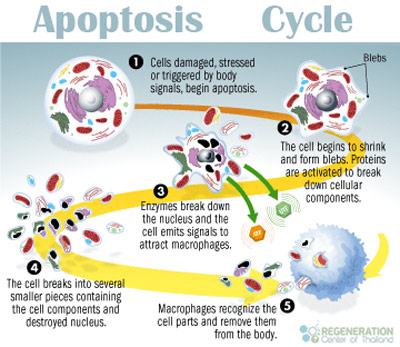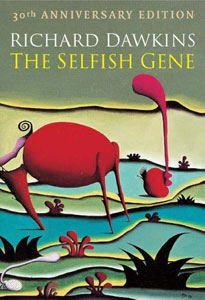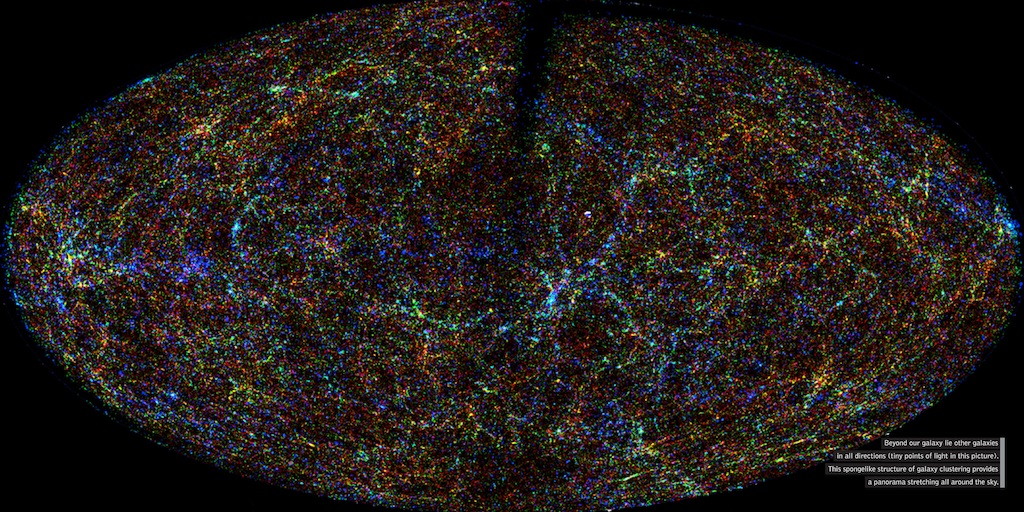A comment by Sy Garte on a recent post, and some recent reading, prompts this. He said:
In fact, I am in quite the minority of environmentalists, since I do not necessarily view ALL extinctions as a bad thing by definition. For those who do, I tend to ask, “bad for whom?”
I want to take this in a different context to comment on the idea, as old as Darwin – or rather Malthus – that evolution is an entirely selfish process of struggle to survive, whether one views the selfish agent as the organism, falling over itself to reproduce, or as Dawkins’s genes, cynically puppeteering our bodies and minds to reproduce themselves at our expense.
The reasons it matters, outside of science, are legion. It directly justified Eugenic Theory, two World Wars and the Holocaust. Understood comprehensively, it nullifies the very existence of all that is human. And specifically it fundamentally challenges the Christian teaching that creation is good, leading amongst other things to the anti-Creation theology which says that:
God creates autonomous nature -> selfish evolution -> selfish species -> aboriginal sin -> desperate theodicies
This is expressed by Karl Giberson and Francis Collins in their Language of Faith and Science:
Selfishness, in fact, drives the evolutionary process. Unselfish creatures died, and their unselfish genes perished with them. Selfish creatures, who attended to their own needs for food, power, and sex, flourished and passed on these genes to their offspring. After many generations selfishness was so fully programmed in our genomes that it was a significant part of what we now call human nature.
It was therefore refreshing, reading Conor Cunningham’s rather less superficial book Darwin’s Pious Idea to see the idea of genetic selfishness comprehensively demolished intellectually, and even the existence of genes as such shown to be increasingly questionable. Incidentally he also adds the reminder that any theology wedded to a consensus scientific theory is destined soon to be widowed – would that TEs would appreciate that.
It was even more refreshing, though, to read some work based on wider biological principles than genetics, suggesting that co-operation is global and essential to life, and selfishness (if even a coherent concept) merely local and relative. Space forbids entering into that here, but examples would include the fact that both mitochondria and chloroplasts originated symbiotic organs between different kingdoms of life, that vertebrate digestion depends on bacteria (which in turn depend on digestion) and so on. Apart from anything else, a broader view of biology brings other possible means of inheritance into view, besides the genetic. What, for example, is cytoplasm – apparently a major transmitter of organismal form – seeking to get out of reproduction, since it has no genes it wishes to preserve?
Today, though, I want to suggest that “bad for whom?” is a very good question to ask with regard to evolution as well as extinction. They may actually reflect the same large-scale reality.
One issue that has challenged evolution since Darwin is that of “altruism”, of creatures sacrificing their lives for others. It’s usually been explained in terms of “kin selection” in various forms, ie that giving my life for a relative will help preserve at least some of my genes, thus enabling all altruism to be reduced to disguised selfishness. This cynical view reached its peak in sociobiology, where all human values were denied in Michael Ghiselin’s quote:
Scratch an altruist and watch a hypocrite bleed.
or if you prefer, in J B S Haldane’s calculation:
“I will die for two brothers or eight cousins”
But for all the speculative genetic maths, kin selection and its kindred theories complicate the simple idea that each organism is involved in a struggle for its survival. If the self-sacrifice we see in animals and experience in ourselves “emerged” from such a struggle, it makes the virtue no more or less real than the practice of a science that “emerged” from the same struggle. And if intellectual enterprise can, as we daily see, be pursued without any reference to reproductive success (by elderly batchelors like Alfed Russel Wallace, for example), then so can virtue be its own reward.
Yet part of the artificiality of the discussion stems, it seems to me, from focusing too closely on the individual metazoan organism as that-which-is-to-be-explained. Neodarwinism represents that individual by its genome (though all sexual reproduction begins by sacrificing 50% of ones genetic inheritance every time a sperm and an egg fuse).
Darwin himself faced the problem of colonial insects whose members, many sterile, sacrifice themselves willingly for the good of the colony. In fact, the idea of kin selection probably started here, once it was realised that the shared genes of the colony could be seen as what was being protected.
 All is not quite as inward-looking as it seems though: bee colonies, for example, need a high genetic diversity to remain healthy, which is achieved by the queen’s mating with multiple males, and by unusually large-scale (twenty times that of humans) recombination of genes (here). The workers sacrificing themselves, therefore, are often dying to protect the genes of different fathers from outside the colony, re-combined so thoroughly that one wonders quite what stake the workers have in “their” proxy-descendants. Does a concubine have much stake in the offspring of 100 others in the harem, or does she groom only her own son to succeed the throne?
All is not quite as inward-looking as it seems though: bee colonies, for example, need a high genetic diversity to remain healthy, which is achieved by the queen’s mating with multiple males, and by unusually large-scale (twenty times that of humans) recombination of genes (here). The workers sacrificing themselves, therefore, are often dying to protect the genes of different fathers from outside the colony, re-combined so thoroughly that one wonders quite what stake the workers have in “their” proxy-descendants. Does a concubine have much stake in the offspring of 100 others in the harem, or does she groom only her own son to succeed the throne?
Complicating life even more is the phenomenon of insect slavery. In the case of slave ants:
Later, host workers emerging in the parasite nest will be imprinted on and integrated into the mixed colony where they rear the parasite brood, feed and groom the parasite workers, defend the nest against aliens, and even participate in raids, including raids against their original colony. Altruistic acts of slaves are thus directed toward unrelated individuals. One hypothesis suggests that slave deception is possible because slaves are captured as pupae and learn the slave-maker colony odour after emergence.
Darwin, of course, regarded this as a moral outrage – perhaps partly because it seems to violate the principle that the struggle is all about individual reproduction. But viewing it as an “aberration” caused by the selfishness of the enslavers would appear to be simply a choice of viewpoint: why labour to find a kin-selection explanation for the bees, when whatever explains the ants would work as well?
 Be that as it may, the principle I want to stress here is that “fitness” need not be focused on the individual and its offspring even in the lowly insect – even when the link to colony inheritance becomes diluted. If insect colonies can be the effective units of selection, then why not an entire species, for example, which shares a common gene pool? After all, in this last week the United Nations has passed a resolution to fight Satan’s death-cult Daeish on the basis that it’s a threat to humanity at large. In the longer term global issues of trade, climate change and so on, though not without complications of self-interest, are routinely addressed – on the basis of general human well being. Why should that be regarded as any more odd biologically than workers in a hive seeking the common good?
Be that as it may, the principle I want to stress here is that “fitness” need not be focused on the individual and its offspring even in the lowly insect – even when the link to colony inheritance becomes diluted. If insect colonies can be the effective units of selection, then why not an entire species, for example, which shares a common gene pool? After all, in this last week the United Nations has passed a resolution to fight Satan’s death-cult Daeish on the basis that it’s a threat to humanity at large. In the longer term global issues of trade, climate change and so on, though not without complications of self-interest, are routinely addressed – on the basis of general human well being. Why should that be regarded as any more odd biologically than workers in a hive seeking the common good?
Come to that, you could even regard attempts to save the great apes as kin selection, given that they are supposed to have nearly as many genes in common with us as we have with each other. If that’s pushing evolution too far, let’s rein back on kin selection too. After all, I share 50% of my genes with bananas, which is more than I do with seven cousins. (Maybe that kind of kin-selection calculation, in the heat of battle, makes evolutionary sense of the Welshman Henry VII’s crying “My kingdom for a horse”!)
This question of which levels of organisation one chooses to be significant can be pursued at the micro- as well as the macro-scale. Cooperation and self-sacrifice can be seen at the global human level, as we’ve seen. But it can also be seen within individual organisms, for what is a metazoan like a human being, biologically speaking, but a colonial protozoon with anything up to 37 trillion members? All day, every day, our individual cells die on our behalf: skin and gut cells are shed, immune cells act as suicide bombers against invaders, and so on, and we take it for granted that they should. We even have “sterile workers” in the form of red blood cells, that never reproduce. For some reason we don’t see it as the same kind of red in tooth and claw struggle and God-questioning suffering we would  attribute to an elephant fighting for her calf, a polychaete worm rupturing in childbirth, or those hard-done-by slave ants.
attribute to an elephant fighting for her calf, a polychaete worm rupturing in childbirth, or those hard-done-by slave ants.
Instead we see it, rightly, as the harmonious operation of a legitimately constituted being. With Neodarwinian spectacles it even seems a pure case of “kin selection”, in that the cells that have opted to become our particular tissues share the same genome. But on the other hand, it’s now well known that that genome is expressed very differently in the various cell types – one might ask what interest a bone cell has in a sperm passing on its particular half-genome, most of which the bone cell doesn’t use.
But it’s not even as simple as that. One dogma of genomics is that all our cells share the same genome – you’ll find that fact all over the internet if you search. But that now appears no more true than the until-recently “central dogma” of Neodarwinism, that information flows only from DNA, not to it. Here’s some research from McGill University, Montreal, from 2009, showing that cell types are genetically dissimilar:
[T]he researchers discovered major differences between BAK genes [which mediate cell death] in blood cells and tissue cells coming from the same individuals, with the suspected disease “trigger” residing only in the tissue. Moreover, the same differences were later evident in samples derived from healthy individuals.
And here’s some from Yale in 2012:
“We found that humans are made up of a mosaic of cells with different genomes,” said lead author Dr. Flora Vaccarino, the Harris Professor of Child Psychiatry at the Yale Child Study Center. “We saw that 30 percent of skin cells harbor copy number variations (CNV), which are segments of DNA that are deleted or duplicated. Previously it was assumed that these variations only occurred in cases of disease, such as cancer. The mosaic that we’ve seen in the skin could also be found in the blood, in the brain, and in other parts of the human body.
So what’s happening here? Are cells giving their lives for mere crumbs of their genome, like the workers in a hive? Or have they been duped by “the organism” like the slaves in the ant’s nest? Or, maybe, the whole question isn’t usefully regarded in the sole light of “selfish” reproductive success at all, but rather in terms of various heirarchies of cooperative “commonwealth.”
Include the genes in that by all means – if you can find them. Certainly there is also a level at which cells work hard to maintain their identity. Then there is the level of the organism. Then there is the level of the colony, where appropriate, or the social grouping. Then the species. But above that is the level of the ecosystem, which is an environmental construct – and is not the “environment” supposed to be the mediator of natural selection, and therefore the most obvious “fundamental” unit of evolution? And of course, even above that is the biosphere, which is to the ecosystem what a colony is to an individual bee or ant.
 Above that, speaking naturalistically, would be Gaia – the self-maintaining system of the earth itself, of which life is just one part. But as Christians, maybe we need at this point to be even more aware of the providence of God – the governor of the household – as the unifying principle, since nobody seriously suggests “selfishness” to be what keeps the earth in equilibrium. Indeed, invoking God takes the oikonomos up to the level of the whole Universe, and down to the level of the quark, for all the levels I have written about are, in reality, as inextricably interrelated as the systems of an individual cell or organism.
Above that, speaking naturalistically, would be Gaia – the self-maintaining system of the earth itself, of which life is just one part. But as Christians, maybe we need at this point to be even more aware of the providence of God – the governor of the household – as the unifying principle, since nobody seriously suggests “selfishness” to be what keeps the earth in equilibrium. Indeed, invoking God takes the oikonomos up to the level of the whole Universe, and down to the level of the quark, for all the levels I have written about are, in reality, as inextricably interrelated as the systems of an individual cell or organism.
It may well be, of course, that there are individual principles keeping particular levels of the heirarchy in balance, which can be identified by science. But just as reductionism is looking less and less useful in the field of life (“selfish genes”? C’mon! Why not selfish atoms?), I suspect we may find that all our work leads us to say, more and more, simply,
“How great are Your works, O LORD! Your thoughts are very deep.” (Ps 92.5)


